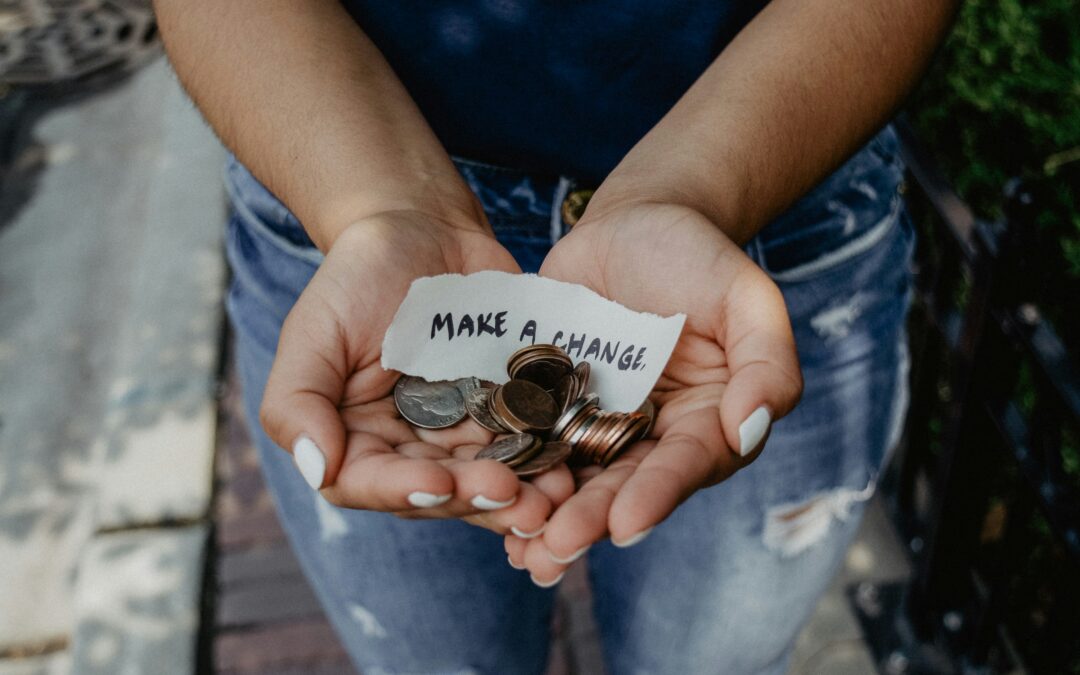Your money mindset is your own beliefs around money. Your attitude around money, which drives you to make decisions about your money.
What is your money mindset?
There are various thoughts and beliefs we can have around money, some examples are:
- I am in control of my financial wellness.
- I believe I have all the money I need.
- My money goes to what I value.
- I have a healthy relationship with money.
- I never have enough money for the things I need.
- My money seems to come in and then disappear.
- I will always be broke.
- I am out of control with my money.
The way you think about money will impact how you manage your money, how you feel about debt, what you are willing to save, as well as your thoughts about people who make more or less than you do.
How is your money mindset formed?
There are many different things that influence our thoughts or mindset around money. I was on a call with a lady last week and we were talking about our upbringing around money. For her money was not spoke about in the household and if it was it was tense. It wasn’t an open communicated topic.
For me I remember my mom working on the bills, she would let us kids come help. We would put the return addresses and stamps on the envelopes. We also were taught how to write the checks, then mom would sign them. We would even enter things in to the check register and total it. Even though I wasn’t aware of the exact money’s my parents did or didn’t have, it wasn’t a secret when it came to expenses, paying bills and large purchases. I remember my parents talking about big purchases, knowing what money they had in the bank and what they were planning for when it came to family vacations, home improvements and purchases. We were also taught to save. They helped us see the value of money and to learn how to manage our money in order to pay our bills. Such as being responsible for paying my auto insurance, gas, entertainment and other things.
Thinking about how money was handled in your household as you grew up will help you understand your beliefs and your foundation around money. Each family does things differently, if you are in a relationship have an open discussion with your partner about money and what the atmosphere was like for each of you growing up. This will help you both when it coms to managing your money together as a couple.
Talking about money can get emotional.
Talking about money can bring up a lot of different emotions for people. Some people love crunching the numbers, keeping track of every dollar and knowing where the money is going. Money is a neutral topic that is part of everyday life. Then for some it can cause a lot of anxiety and stress. It can be a topic of tension and even lead to arguments and even blame.
Having awareness around our thoughts about money is helpful so we can understand why we are feeling the way we do about money and what our beliefs are . Our beliefs impact how we handle our money.
How can you change your money mindset?
Here are a few things you can do to improve your money mindset.
- Forgive your past self for unwise financial decisions.
- Understand your thoughts and emotions when it comes to money.
- Comparing yourself to others and their financial situation doesn’t help.
- Work to build good habits around money and spending.
- Create a realistic budget.
- Show appreciation.
Forgive your past self for unwise financial decisions.
We all make unwise decisions at times. Maybe you have make an unwise purchase, had an impulse purchase that later you realize you wish you wouldn’t have made. Perhaps you overpaid for a vehicle because you told yourself you had to have it or you wanted to appear like you had it all.
Those decisions are in the past. You may be suffering the consequences of those decisions, but betting yourself up over it is not serving you or beneficial. Find the learning point in the experience. Learn from your mistakes, but be forgiving of yourself. If you have debt from previous money decisions, that is ok, don’t beat yourself up about them. Focus on paying down the debt and create better habits moving forward.
Understand your thoughts and emotions when it comes to money.
Do a self evaluation around purchases or financial decisions. Ask yourself: What am I thinking right now about this purchase or financial decision? How does that make me feel? Go through it with a non-judgmental open mind. Just be curious with yourself and show yourself grace. You may find that there are some things that are causing higher stress for you and other things that you thought would bring you happiness, but are really causing extra anxiety. It isn’t that you can’t spend money on yourself or extras at times, just having awareness as to why can be so beneficial.
Comparing yourself to others and their financial situation doesn’t help.
When we compare ourselves to others the lens in which we are viewing it is never clear. We don’t have all the facts and financial details of the other person. What we see on social media or in person is only a fraction of the picture. Even when it seems like they have it all, doesn’t mean they really do. We don’t know if they seem to have all the newest and greatest things, but are really swimming in debt. They could be behind on payments, have credit card debt, or owe others money. We don’t have the full picture.
Comparing yourself to someone else is not going to help you move forward. We will never have the full picture of the other persons finances. It can cause discouragement and can cause you to feel like your goals are unreachable.
Work to build good habits around money and spending.
Spend time reviewing your finances. Set aside time to go over your bills, budget and spending habits. Make note of areas that you want to work on and can improve in. Avoiding the issue won’t ever make it go away, it will continue to be a source of stress and anxiety.
Create small, reachable, realistic goals for yourself around your money. Big changes won’t happen overnight, but each little change will lead to big changes in the long run.
Create a realistic budget.
Create a budget that works for you, that you are happy with and that will help you reach your financial goals. Some people think that creating a budget is going to be restrictive, but really the opposite is true. Having a budget and telling every dollar where to go puts you in control of where the money goes and what money you have to spend on extras. Many find the 50/20/30 rule to be helpful when it comes to managing their money and creating a budget. Fifty percent of your income should go towards bills and necessities. Twenty percent towards paying off debt and building your savings. The remaining thirty percent is for you to use how you decide.
Show appreciation.
Be thankful for everything you have in life. Be grateful for your friends, family, job, home, food, etc. Life is short and regardless of how much money you have, in the end it doesn’t bring us more happiness or extend our life any longer. Cherish the time with friends and family, be thankful for life and what you have. You can keep working to make more money, but ultimately material things don’t bring us true happiness. We get to decide how to be happy.
You can change your mindset and your finances.
Changing your mindset around money and your finances takes time. You can work at it alone or your can get help. I want you to be empowered to take control of your finances so you can truly enjoy life. It is time to put your focus on things you can control.
Schedule your free consultation call HERE and we we’ll find out exactly where your money mindset came from and how to change your beliefs around money. You will learn to see your money clearly and with confidence.

